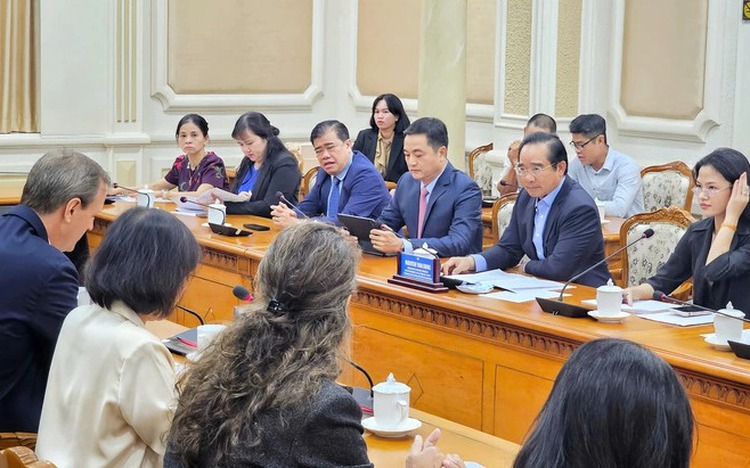
Ho Chi Minh City officials (R) meet with a delegation from the Dutch Business Association Vietnam, October 2, 2025. Photo: Truong Linh / Tuoi Tre
The Dutch delegation was led by Wieste Mutters, chairman of DBAV and managing director of Heineken Vietnam; Gabor Fluit, chairman of DBAV’s Netherlands Chapter and CEO of Royal De Heus; and Fleur Goote, executive director of DBAV, according to the association’s website.
They were joined by Vu Manh Hung, chairman of Hung Nhon Group, a key Vietnamese partner for Dutch enterprises.
The group was welcomed by Nguyen Van Duoc, chairman of the Ho Chi Minh City administration, together with senior city officials.
Duoc praised Dutch businesses for their long-term contributions to Vietnam’s economy, especially in seaports, retail, agriculture, and food security.
He highlighted the roles of Heineken, Royal De Heus, and Hung Nhon in promoting sustainable and clean production.
He outlined the city’s development strategy following its planned integration with Binh Duong and Vung Tau, which envisions building Thu Thiem into an international hub for finance and technology with a focus on semiconductors, digital transformation, and clean energy.
Binh Duong will continue to lead in advanced manufacturing, while Vung Tau will focus on petrochemicals, renewable energy, and the marine economy.
Duoc noted that the Netherlands remains one of Vietnam’s top European partners, with strengths in climate change adaptation, sustainable industry, and green growth.
He said the city seeks deeper collaboration in talent development and called for Dutch support in helping Vietnamese small and medium-sized enterprises (SMEs) meet EU standards and enter global supply chains.
Mutters welcomed the growth in economic ties, pointing out that the Netherlands is Vietnam’s largest export market in the EU and a significant investor.
Bilateral trade reached US$14.2 billion in 2024, up 43 percent from 2020, with Vietnam exporting nearly $13 billion and recording a trade surplus of $11.8 billion.
Vietnam’s major exports include electronics, textiles, seafood, coffee, and footwear, while imports from the Netherlands include high-tech products, machinery, and chemicals.
Dutch investment in Ho Chi Minh City has surpassed $5.1 billion, with around 125 Dutch companies active in the area.
“Dutch businesses are long-term partners of Vietnam,” Mutters said.
“We will continue to contribute to Ho Chi Minh City’s growth agenda, especially in areas where Dutch expertise aligns with the city’s priorities.”
Goote commented that Dutch firms see strong potential in food security, logistics, infrastructure, sustainability, and digitalization in Vietnam and the city.
She introduced DBAV’s Ready to Export program, which helps Vietnamese SMEs improve governance, comply with international standards, and join global supply chains.
She also acknowledged ongoing challenges, including lengthy administrative procedures, infrastructure bottlenecks, limited transparency, and new EU sustainability regulations that present compliance hurdles.
In response, Duoc reaffirmed the city’s commitment to administrative reform, expedited licensing procedures, and enhanced services to better support investors.
He said upcoming transport infrastructure projects — including new railways, highways, and expanded ports — would be critical by 2030 to reduce congestion, lower logistics costs, and support industrial development.


Max: 1500 characters
There are no comments yet. Be the first to comment.